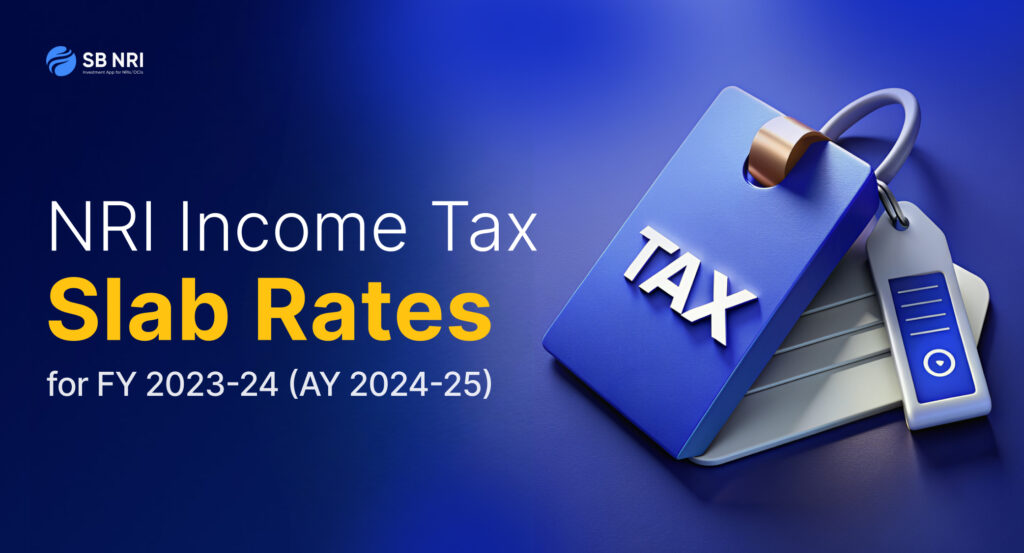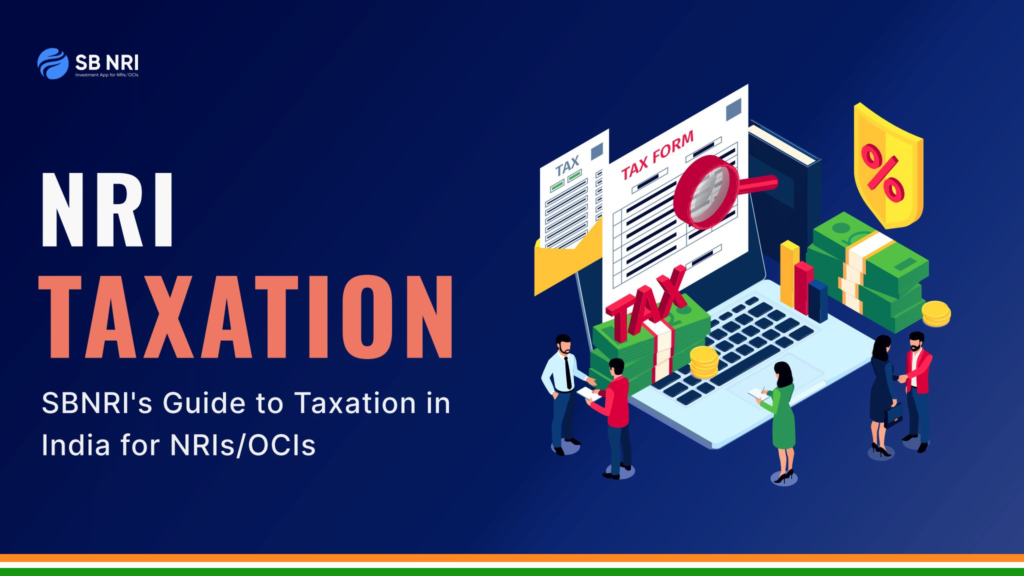
NRI Income Tax Slab Rates FY 2023-24 (AY 2024-25): The taxation system in India is an integral part of the country’s economy. Several taxes are levied on the products and services availed by the citizens of India. These taxes are used to finance social projects, and to improve the products and services used by consumers. There are several taxes for people residing in India and non-residents as well, such as Goods and Service Tax (GST), income tax, property tax, and taxes deducted at source, etc. In this article, we will decode the importance of income tax for NRIs in India while understanding about NRI Income Tax Slab rates for AY 2024-25.
Income tax filing for NRIs in India
Are NRIs required to file Income Tax Returns in India? This is a very common question asked by NRIs. As per NRI Income Tax Slab Rates, an NRI whose annual income exceeds Rs. 2, 50,000 is required to file an income tax return in India.
You must note that rules to determine the residential status of an individuals change every year. Hence, it is important to be aware of new rules for NRI taxation in India.

Also Read: Income Tax e-filing: Top 10 NRI Income Tax Filing Benefits
NRI Income Tax Slab Rates for AY 2024-25 (FY 2023-24) – New Tax Regime & Old Tax Regime
| Income Tax Slab | Old Regime Slab Rates for FY 23-24 (AY 24-25) |
|---|---|
| Up to Rs. 2.50 lakh | Nil |
| Rs. 2,50,000 -Rs. 5,00,000 | 5% |
| Above Rs. 5 lakh to Rs. 6 lakh | Rs. 12,500 + 20% |
| Above Rs. 6 lakh to Rs. 7.50 lakh | Rs. 12,500 + 20% |
| Rs. 7.50,000 to Rs. 9,00,000 | Rs. 12,500 + 20% |
| Rs. 9,00,000 to Rs. 10,00,000 | Rs. 12,500 + 20% |
| Rs. 10,00,000-Rs. 12,00,000 | Rs. 1,12,500 + 30% |
| Rs. 12,00,000-Rs. 12,50,000 | Rs. 1,12,500 + 30% |
| Rs. 12,50,000-Rs. 15,00,000 | Rs. 1,12,500 + 30% |
| Above Rs. 15,00,000 | Rs. 1,12,500 + 30% |
| Income Tax Slab | New Regime Slab Rates for FY 23-24 (AY 24-25) |
|---|---|
| Up to Rs. 3 lakh | Nil |
| Rs. 3,00,000 -Rs. 6,00,000 | 5% (Rebate u/s 87A available) |
| Rs. 6,00,001 lakh to Rs. 9,00,000 | 10% (Rebate u/s 87A available for taxable income up to 7 lacs) |
| Rs. 9,00,001 to Rs. 12,00,000 | 15% |
| Rs. 12,00,001 to Rs. 15,00,000 | 20% |
| Above Rs 15,00,000 | 30% |
Note:
- Income tax exemption limit for NRI taxpayers is up to Rs. 2,50,000.
- NRIs opting for the new tax regime with lower rates will not be eligible for certain exemptions and deductions (like 80C, 80D, 80TTB, HRA).
- If they continue to pay taxes under the existing tax regime, NRIs can avail rebate and exemptions.
- NRIs can avail the new tax regime in India but they can’t claim the rebate on full tax for income up to Rs. 7 lakh. Only residents can claim the rebate on it.

Can NRI Opt for New Tax Regime?
Yes, NRIs (Non-resident Indians) can opt for the New tax Regime in India, which raises the threshold for basic exemption to Rs. 3,00,000. But, NRIs are not eligible to receive the complete tax rebate for income up to Rs. 7,00,000, a benefit reserved for residents. Also, NRIs who choose the new tax regime will not qualify for specific exemptions and deductions (such as 80C, 80D, 80TTB, HRA).
Also read: 5 Tips for NRIs Filing Income Tax Returns in India
Surcharge on Income Earned by NRIs
Non-residents earning income above the specified limit will have to pay additional charge known as surcharge:
- 10% of income tax for taxable income above Rs. 50 lakh to Rs. 1 cr
- 15% of income tax for taxable income above Rs. 1 cr to Rs. 2 cr
- 25% of income tax for taxable income above Rs. 2 cr to Rs. 5 cr
- 37% of income tax for taxable income above Rs. 5 cr
Note: Maximum surcharge on income earned out of dividend or income under provision 111A, 112A, and 115AD is 15%
NRIs are liable to pay taxes as and when their income falls under the jurisdiction of the Income Tax Act of 1961. The details about income tax for NRIs and the method of dealing with them fall under the category of NRI taxation. NRI taxation covers all the aspects of income tax, property tax and wealth tax. However, the focal point of taxation lies on the income tax.
Also Read: 5 Ways to save on the tax NRIs have to pay
Income Tax for NRIs
Before discussing the Non-Resident Indian income tax, let’s understand who is an NRI under the Income-tax Law.
Determining NRI Residential Status
The Foreign Exchange Management Act (FEMA) has issued clear guidelines to ascertain the residential status of an individual. As per the Indian Income Tax Law, an individual will be treated as a resident Indian for a year if he/she satisfies any of the following conditions:
- He/ she has lived in India for a period of at least 182 days during the financial year. Or
- He/ she has lived in India for a period of 60 days or more in the year and for a period of at least 365 days or more in the preceding four years.
However, if an Indian citizen leaves India in any previous year as a crew member of an Indian merchant ship or for the purpose of employment, the period of 60 days mentioned in the second point shall be substituted with 182 days.
If the individual satisfies any one or both the conditions, he/she is considered a resident. If he/she satisfies no conditions, he/she will become a Non-Resident Indian (NRI).
Also read: Can NRIs file ITR 1 in India? Types of ITR forms for NRIs
NRI Tax Slab in India: Taxable income of NRIs
If you reside and work abroad, your tax liability as an NRI will depend on your residential status for the year. Residential status of an individual is divided into three categories – Resident and Ordinarily Resident (ROR), Resident but Not Ordinarily Resident (RNOR) and Non-Resident (NR). The scope of taxation in India based on the residential status of an Individual would be as under:
| Particulars | ROR | RNOR | NR |
|---|---|---|---|
| Income received or considered to be received in India | Taxable | Taxable | Taxable |
| Income earned or accrued in India | Taxable | Taxable | Taxable |
| Income that accrues outside India from: – Business controlled in India or profession established in India – Other income | Taxable Taxable | Taxable Nontaxable | Nontaxable Nontaxable |
The income tax for NRIs is levied on the following income:
1. Salary received for services provided in India
- Salary or income received by an NRI for the services provided in India shall be taxable, irrespective of the place of receipt. Salary of an Indian citizen paid by the Government of India for the services rendered outside India will be considered as Indian income and taxed even if the status of the individual is Non-Resident.
2. House Property Income
- Rental income from property owned in India by an NRI is taxable in the same manner as the resident.
- Capital gains generated from the sale of a property, rental income, etc. in India are subject to tax.
- NRI can claim a standard deduction of 30% in India. Under Section 80C, NRIs can also claim deductions for principal repayment, registration charges and stamp duty. They can also claim tax deductions up to Rs. 1.5 lakh on interest paid on a home loan during a financial year.
- The tenant who makes rental payments to NRI will be responsible for TDS deduction at 30% under Section 195. He/she will need to fill the form 15CA and submit it online to the income tax department.
Also read: NRI Tax on Rental Income: Rules, Rates and More
3. Capital Gains Income
- Capital gains or income from the sale of listed short-term/ long-term securities, mutual funds are taxable.
- Capital gains on shares held in India are subject to tax.
- Capital assets like house property, securities, shares, gold etc. of Indian origin are taxable in India.
- Capital gains upon the transfer of any capital asset situated in India are taxable.
4. Income from other Sources
- The interest income accrued from fixed deposits and savings bank accounts held by an NRI in Indian bank accounts is taxable in India.
- Interest on an NRO account is fully taxable. Interest earned on NRE and FCNR accounts is tax-free in India.
5. Income from Business and Profession
- Any income earned by NRIs from a business established or controlled in India is taxable to the NRI.

NRI Income Tax Slab Rates: TDS Rate on Sale of Property
The NRI income tax slab rates explains how much taxes are applicable for a certain bracket of income. However, some aspects like the TDS Rate on sale of property often pops up as a doubt in the minds of NRIs. Here is a quick view on the TDS Rate on sale of property for NRIs:
| Nature of Gains | Tax Liable | Tax Deducted at Source (TDS) |
|---|---|---|
| Short Term | As per Tax Slab | 30% |
| Long Term | 20% | 20% (plus surcharge and cess) with indexation |
Note: Minimum Holding Period for Long Term Gains is 2 years
Also read: TDS on Sale of Property by NRI in India [New Rates for 2024]
Deductions available to NRIs
Similar to resident Indians, NRIs can also claim various deductions and exemptions from their income in India. The following table shows the deductions and exemptions on Non-Resident Indian Income Tax:
| Particulars | Deductions |
|---|---|
| Section 80C | The following deductions are available under Section 80C – Investment in ULIPs – Premium payment of a life insurance policy – Investment in ELSS – Principal repayment of a home loan in India – Payment of tuition fees of children |
| Section 80D | Premium paid towards a health insurance policy |
| Section 80E | Interest paid on an education loan |
| Section 80G | Donations for social service activities |
| Section 80TTA | NRIs can claim a deduction up to Rs. 10,000 on income from interest on a savings bank account |
| House property income of NRIs | NRIs can claim deductions on income from house property in India, the property tax paid, and interest on home loan |
Deduction Unavailable to NRIs
NRIs are not entitled to avail the following deductions under the Income Tax Act, 1961:
- Investment under RGESS (Rajiv Gandhi Equity Savings Scheme) under Section 80CCG
- Deductions for the differently-abled under Section 80U, Section 80DD and Section 80DDB
- Investments which are not available for NRIs as listed below:
- National Savings Certificate (NSC)
- Public Provident Fund (PPF)
- Senior Citizen Savings Scheme
- Post Office 5-year Deposit Scheme
Last date to File Income Tax Return in India
For NRIs, 31st July of the assessment year is the last date to file Income Tax Return in India.
How to File ITR for NRI AY 2023-24
Outlined below are the necessary steps to file their income tax returns for NRI AY 2023-24
- Determine Your Residential Status
- The initial step in filing income tax returns for NRIs involves determining their tax residency status. This determination is based on the provisions outlined in Section 6 of the Income Tax Act, 1961.
- Reconcile Income and Taxes Using Form 26AS
- NRIs, as per tax treaties, may be eligible for specific benefits and can claim refunds if Tax Deducted at Source (TDS) has been deducted from their income. To facilitate this, it is crucial for NRIs to report their TDS credit and advance tax details in Form 26AS.
- Calculate Your Taxable Income
- NRIs are liable to pay taxes in India on various types of income, including interest earned on NRO (Non-Resident Ordinary) accounts, capital gains or dividends from Indian shares, and rental income from property. Furthermore, eligible deductions under Section 80C can be applied to reduce the taxable income.
- Determine Tax Liability
- Tax liability for NRIs is determined by considering the applicable tax slab rates for NRIs, with a basic exemption limit of Rs 2.5 lakh applying to all NRIs before factoring in deductions or exemptions.
- Claim DTAA Benefit
- Under the Double Tax Avoidance Agreement (DTAA), NRIs can avoid being taxed twice on the same income. The DTAA enables income to be exempt from taxation in one country or taxed at a reduced rate in the individual’s home country.
- Verify IT Returns
- After completing the process of filing the income tax return form, it is essential to verify the return within a 30-day time frame. NRIs can conveniently e-verify their IT returns from abroad through net banking, eliminating the need for a one-time password (OTP).
Can NRIs use ITR 1 to file returns?
- NRIs cannot use ITR 1. This form is exclusively for resident individuals with income from salary, one house property, and other sources, and total income should not exceed ₹50 lakh. Since they do not qualify as residents, they need to opt for other ITR forms for NRIs.
Access SBNRI’s Exclusive NRI Taxation Guide

NRIs and OCIs can now access SBNRI’s exclusive NRI Taxation Guide covering in-depth information about DTAA, Gift Tax, Rental Income Tax, ITR Filing, Types of ITR Forms for NRIs, Capital Gain Tax, Income Tax, and more. The report will help you understand India taxation on mutual funds, other asset classes and how you can comply with the regulations.
Access NRI Taxation report here
Double Taxation Avoidance Agreement (DTAA)
India has entered into the Double Taxation Avoidance Agreement (DTAA) with more than 90 countries across the world. Whereby NRIs have to pay tax in either of the countries. In other words, NRIs can avoid getting taxed on the same income twice in the country of their residence and India by applying for relief under DTAA between the two countries. There are two ways to claim tax relief – exemption method and tax credit method. As per the exemption method, the income of NRIs is taxed in one country and exempted in another. As per the tax credit method, the income is taxed in both countries, the exemption can be claimed in the country of residence. NRIs currently living in one of these countries are exempt from double taxation.
Calculate your TDS Refund with SBNRI’s TDS Refund Calculator
A TDS refund is the process of reclaiming the excess tax deducted at source by the payer if the actual tax liability of the taxpayer is lower than the TDS deducted. This situation typically arises when the income tax calculated on the total income is less than the TDS already deducted. To claim a TDS refund, taxpayers need to file an income tax return (ITR). The Income Tax Department processes the ITR and verifies the details. If the tax department finds that the TDS paid is more than the actual tax liability, the excess amount is refunded to the taxpayer.
You can easily find out how much tax refund you can get by calculating your TDS Refund from this TDS Refund Calculator.
Looking for NRI ITR Filing? Connect with SBNRI NRI Tax Expert CA Today!

At SBNRI, we have simplified ITR filing for NRIs/OCIs through a smooth digital journey. Be it Basic Filing, Advanced Filing (includes Capital Gain, etc.), or Premium Filing (Foreign Income), we can help you assess the right computation and lower your tax liability.
“We’ve helped over 500+ NRIs/OCIs file ITR returns and more than 25,000+ across other taxation services last financial year and we’d love to help you out too”
You can download SBNRI App or connect with NRI Tax Expert team directly via the button below.
NRI Income Tax Slab Rates: FAQs
How to save on taxes in India by NRI?
NRIs can save on taxes in India by utilizing several deductions and benefits. They can claim a standard deduction of 30% and deduct property taxes and interest from a home loan.
Should NRIs file tax returns in India?
NRIs should file income tax returns in India if they earned income in India during the financial year. Their tax liability depends on their residential status.
What are 120 days rules for NRIs?
The 120 days rule for NRIs states that if they spend more than 120 days but less than 182 days in India and their total income from India is ₹15 lakh or more, they are considered “resident but not ordinary resident” (RNOR).
How to avoid TDS for NRI?
- One way is by opening a specific bank account like:
- A Non-Resident Ordinary Rupee Account (NRO)
- A Foreign Currency Non-Resident Account (FCNR)
- A Non-Resident External Account (NRE)
What is the rule for NRI in ITR?
If the annual returns for NRIs cross the basic exemption limit of Rs 2.5 lakh, NRIs should file their return. However, there are cases where the NRIs/OCIs need to file their return even if their income is less than Rs 2.5 lakh. Here are those cases:
- If you have deposits or aggregate of more than 1 cr in one or more current accounts
- If you spend more than 2 lacs on foreign travel
- If you spend more than 1 lacs on electricity expenditure
What is the penalty for not declaring NRI status?
There is no penalty for not declaring NRI status. However, we advise you to update your NRI status on the IT portal and also close your resident savings account. This will help you to avoid any discrepancies from the IT department and also help you comply with the regulations.
Do NRIs pay capital gains tax?
Yes, capital gains tax provisions for an NRI are similar to those for a resident individual except for the applicability of TDS provisions. Like resident investors, capital gains tax for an NRI depends on the holding period and the type of property sold.
How long can I maintain NRI status after returning to India?
For RNORs returning to India, they can retain their RNOR status for up to 3 years after their return. During this period, any income earned in India will be taxable, while income earned abroad will not be taxable, similar to the tax treatment for NRIs, for those 3 years post-return.
What is the 4 year rule of NRI?
An individual is considered an NRI under the Income Tax Act if they have been in India for fewer than 182 days in the preceding financial year, or if they have been in India for fewer than 60 days during the previous year and 365 days or less over the past four years.
What is the 182 days rule for NRI?
NRI can stay in India for more than 182 days during a financial year. However, doing so will change their residential status from NRI to resident. In other words, to retain NRI status, an individual must stay in India for fewer than 182 days in a financial year.
What is the 240 days rule for NRI?
The 240 days rule for NRI refers to a provision introduced in the Finance Act 2020. According to this rule, an individual will be considered an NRI if they stay in India for 240 days or less during a financial year, provided they also meet certain other conditions related to previous years’ stays in India. This amendment was made to provide more clarity and flexibility for determining NRI status, ensuring that individuals who spend a significant portion of the year outside India are not taxed as residents.
When is the last date to file an income tax return in India for NRIs?
NRIs need to file income tax returns in India before 31st July without any penalty, unless the government extends the last date.
Is NRI subject to capital gains tax on sale of a flat owned by him/her in India?
Yes. An NRI seller is liable for capital gains tax in India upon the sale of their property. The purchaser needs to deduct taxes on sale consideration. The tax deduction rate for a long-term capital gain is 20% plus applicable surcharge and cess. On a short-term capital asset, tax is deductible at 30% plus applicable surcharge and cess. However, there is a provision under the law wherein you can apply for a lower TDS certificate.
Can NRIs continue to use their resident savings account?
As per the regulations of the Foreign Exchange Management Act (FEMA), it is prohibited for non-residents to maintain resident savings accounts in India. Therefore, it is necessary to convert your resident savings account into an NRO (Non-Resident Ordinary) account. Failure to comply with this requirement and continuing to use the resident account may result in significant penalties being imposed.
How can NRIs benefit from Double Tax Avoidance Agreement (DTAA)?
NRIs have two avenues to benefit from double taxation relief, as outlined below:
- Tax Credit Method: In the Tax Credit Method, the home country allows the NRI to claim a tax credit for the tax paid in the source country where the income is earned.
- Tax Exemption Method: In the Tax Exemption Method, the income is taxed in one country and exempted from taxation in another country.
Do NRIs need to be present in India to file an ITR?
No, it is not true. NRIs can easily file and validate their income tax returns online from anywhere in the world.
Do NRIs need to pay advance tax?
If their tax liability exceeds Rs. 10,000 in a financial year, NRIs have to pay advance tax. Under Section 234B and Section 234C, interest will be applicable if you don’t pay your advance tax.
Is there any income tax for NRI in India?
An NRI’s income which is earned or accrued in India is taxable in India. The income earned outside India by an NRI is not taxable in India. Interest earned on NRE and FCNR savings and fixed deposit accounts is tax-free in India. However, interest earned on an NRO account is taxable.
What is the income tax rate for NRIs?
NRI income tax rates are mentioned in the first table in this blog along with the NRI income tax slabs.
When should an NRI file an income tax return in India?
Like resident taxpayers, an NRI must file his/her return of income in India if his/ her Indian income exceeds Rs. 2.5 lakh for the financial year. The last date for income tax filing for NRIs is 31st July of the assessment year.
Is an NRI subject to capital gains tax if he sells his house property in India?
Yes, an NRI will be liable to pay capital gains tax in India upon the sale of his flat. The buyer must deduct taxes on the quantum of gains made by an NRI. The tax deduction rate for a long-term asset would be 20%.
Can NRI claim TDS refund?
If an NRI files Income Tax Return (ITR) after the termination of the financial year in India, they can claim on the deducted TDS. NRI will need to compute his/ her income and tax liability as per the existing slab rates to claim a refund on the TDS.
Is TDS applicable to NRIs?
Interest earned on NRE and FCNR accounts is tax-free in India. Hence there is no TDS. However, interest earned on an NRO account is taxable and will be subject to a TDS of 30%. Other incomes like capital gains, fees for professional services, rental income, etc. may also be liable to TDS.
How can NRI avoid TDS?
An NRI can reduce the TDS liability on sale of his/ her property. The NRI needs to file an application in Form 13 with the Income Tax Department for issuance of certificate for lower or Nil deduction of TDS.
Can NRI claim deductions under Section 24?
NRIs can get tax deductions if they have some taxable income in India. They can claim deductions on the repayment of principal and interest components from the taxable income u/s 24, 80C and 80EE of the Income Tax Act.
Is new tax regime applicable to NRIs?
Yes new tax regime is applicable to NRIs. The new tax regime allows the basic exemption to Rs. 3,00,000. However, NRIs can’t claim the rebate on full tax for income up to Rs. 7 lakh.
What is the 80C limit for 2023-24 for NRIs?
Section 80C enables NRIs to lower their taxable income by a maximum deduction of ₹ 1.5 lakh. This deduction can be achieved by making tax-saving investments, such as paying life insurance premiums, expenses like school tuition fees. However, if NRI taxpayers choose the new tax regime, they are not permitted to claim this deduction.



